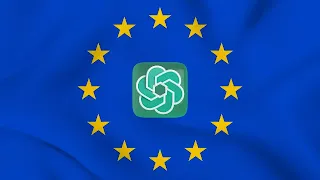In a new threat to the ChatGPT smart chat application, the head of industry in the European Union, Thierry Breton, said in a statement reported by Reuters today that the Union is in the process of studying the potential risks that the ChatGPT smart chat program may bring, within the framework of the European draft law that aims to regulate the work of intelligence software. artificial.
The aforementioned project, known as The AI Act, is the first project of its kind in the world to set laws governing artificial intelligence technologies. The European Union had launched the project in 2021 to develop legal frameworks for the work of artificial intelligence, with the aim of reaching laws that may amount to preventing companies from using artificial intelligence in certain fields.
According to the proposed law's website, AI applications are divided into three types:
Unacceptable: These are applications used to monitor and track individuals, which the proposed law seeks to prevent completely.
High risk: such as applications that are used to automatically review and categorize resumes, which are applications that must be subject to certain legal requirements.
All other than that: any applications that do not belong to the two previous classifications, as they will be allowed to work without regulation
Thierry Breton's statement is considered a hint to ChatGPT's affiliation with the classification of high-risk applications, especially since the Council of the European Union had issued a statement last December in which it said that the Union recommends placing General-purpose AI applications within the classification of high-risk applications.
This is divided into applications of artificial intelligence into two types?
Single-purpose applications: such as image classification, speech recognition, and financial fraud detection applications.
General purpose applications: These are applications that can perform a variety of tasks.
- ChatGPT is considered a general-purpose application for its ability to perform a wide range of tasks from generating text, solving math problems, answering general questions, writing code, and more. But some experts are skeptical that it is a general-purpose application and see it as a "language model" that still lacks many other capabilities that could make it a general artificial intelligence.
- But ChatGPT, regardless of its classification, has raised concerns because it is used for purposes such as cheating on homework or writing fake news, and hackers have also reportedly used it to help them write malware.
- According to Breton, ChatGPT AI programs underscore the urgency of passing the laws being discussed. He added in his statement to Reuters that these applications provide great opportunities for companies and citizens, but they pose many risks, which is why we need to develop laws to ensure that these applications are trustworthy and able to provide high-quality data, as he put it.
Many companies developing AI applications fear that their applications will be classified as high risk, which may mean harsh legal requirements. Companies have to adhere to it, which increases costs and slows down development.
And in the event that the European Union resorts to classifying ChatGPT and similar programs as (high-risk) programs, this means that the Union's laws will force companies to modify and possibly reduce the capabilities of their programs in order to comply with what is imposed by the new laws.





0 Comments